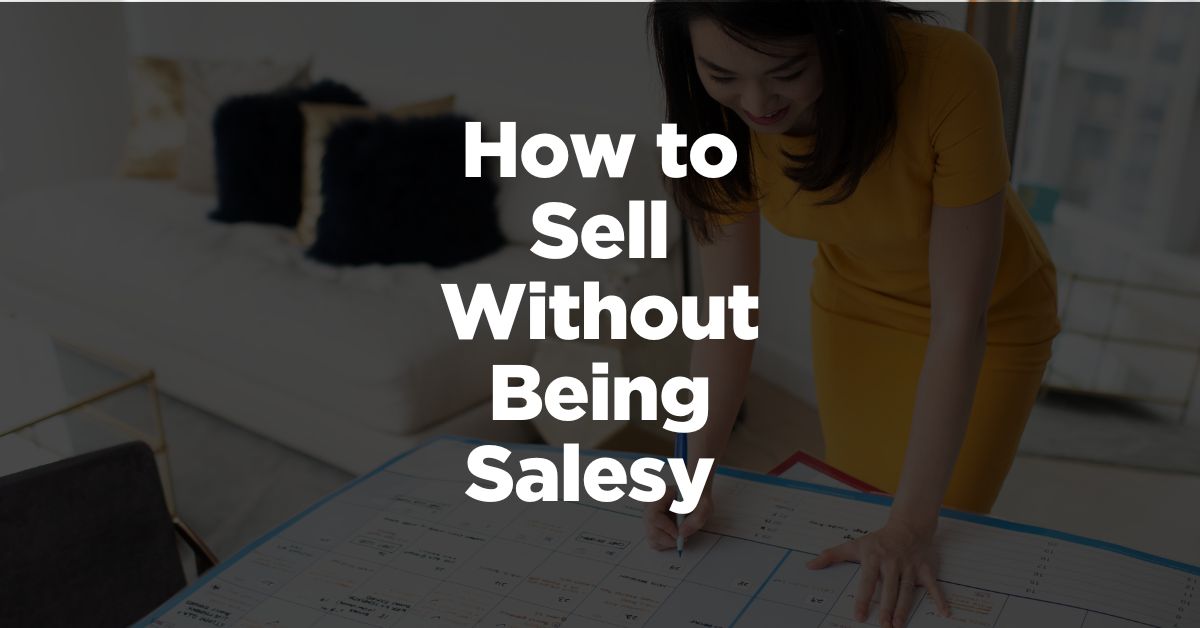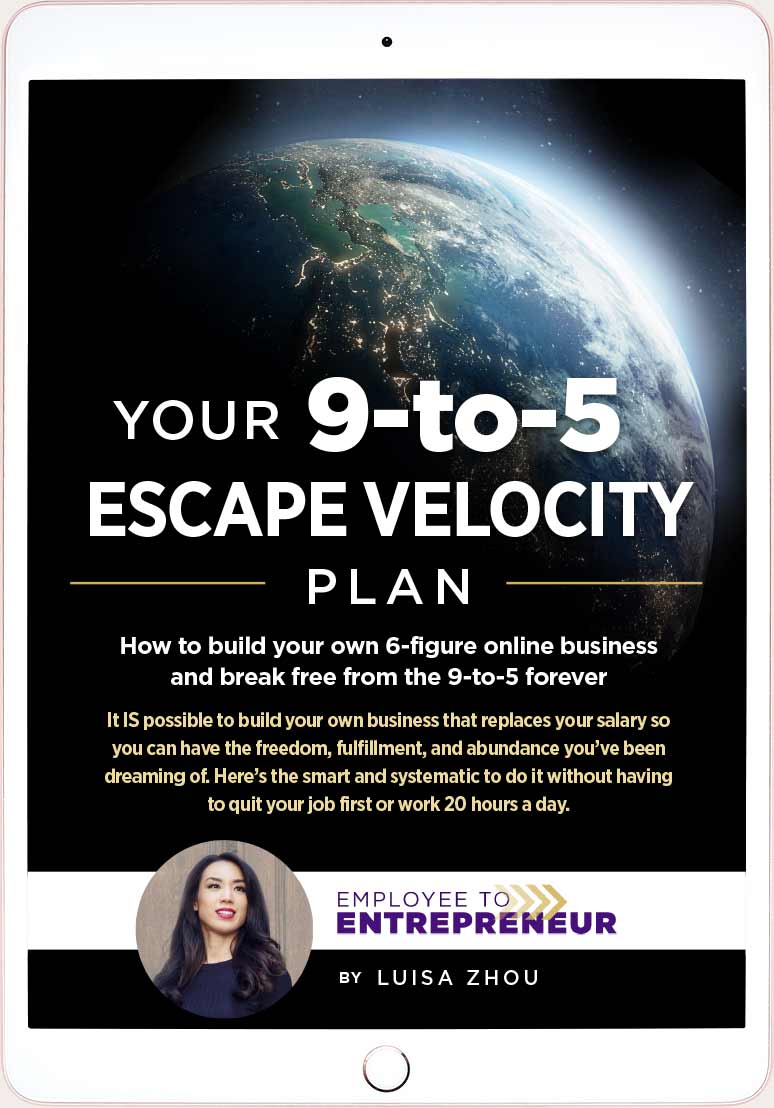Want to learn how to sell without being salesy? You’ve come to the right place.
In this article, you’ll learn:
- What being salesy means (and WHY it’s such a bad idea)
- Examples of salesy language
- How to sell effectively
What I’m going to talk about here can be a total game-changer for your sales and growth.
Let’s dive in!
What does salesy mean?
Something a lot of my students say is, “I don’t want to sound salesy!”
And that’s keeping them back from growing their businesses.
But before anything else, let’s start with a quick definition of what being salesy means.
In a nutshell, it refers to high-pressure tactics that some salespeople use to push people to buy from them.
One problem with this approach?
It’s not centered around what the client needs.
So, rather than coming alongside a prospective client and helping them, salesy tactics are centered around the business and what it needs.
But here’s the thing…
Aggressively trying to convince people that they should buy from you doesn’t work.
Instead, focus on finding out if you and a prospective client are a good fit – and how your solution fixes their problem. (And you’ll learn more about this in a bit).
Get the Ultimate Guide
for building a
6-Figure Coaching Business so you can achieve more freedom!
What is salesy language?
Okay, we’ve already established that salesy language isn’t effective. And that’s why it’s important to ask yourself, “Do I use salesy language to attract clients?”
Let’s take a look at some examples.
- Exaggeration and hype – Avoid saying things like, “You’ll never achieve [blank result] without [my product/service].” Instead, focus on explaining what makes your offer special.
- Superficial language – Be sincere with your prospective clients and don’t sugarcoat what you’re offering to make it sound better.
- Aggressive/pushy techniques – Repeatedly calling or emailing unresponsive prospective clients to try to “convince” them that they’re missing out will make it less likely that they’ll want to buy from you.
- Not focusing on your clients’ needs – What do your clients need from you? That should be your #1 focus.
- Using industry jargon – Jargon might seem sophisticated, but it dilutes your message. Go straight to the point, and use simple words for maximum impact.
- Unrealistic promises – Saying that you can give people huge results within 24 hours might sound impressive. But if it’s not accurate, avoid it.
- Pushing clients to commit immediately – Clients buy when they’re ready, and trying to speed up the process will only push them away.
Alright, now let’s dive deeper and talk about some common words and phrases to avoid.
“I”
It can be tempting to talk from your perspective in a sales pitch. But… this is a mistake.
Avoid talking about yourself.
Listen: Your prospective clients aren’t interested in what you want. Again, to make sales and win people over, you have to focus on them and their needs.
“Feature”
Don’t emphasize what features your product/service includes.
Instead, focus on your clients’ end goals and how you can help them get there.
The reason?
Ultimately, people will buy from you if they believe what you offer will give them the results they’re after.
Remember: Features aren’t nearly as important as a particular outcome.
“Once in a lifetime”
Stay away from fear-based selling tactics, like “This is an exclusive deal that expires in ten hours!”
People shouldn’t feel rushed when they’re thinking about buying from you. They should feel that they’re making an informed purchase that makes sense for them based on their goals.
“Cheap”
Making price a key selling point for why people should buy from you might seem like a good strategy, but it’s not.
And here’s why: A cheap product/service doesn’t provide much value or isn’t unique enough to be worth more.
And that’s an issue.
Why?
Because again, people who are serious about wanting to reach a goal want to know that you can help them get there. In other words? They’re looking for results, not rock-bottom prices.
Focus on your offer and don’t be afraid to charge what it’s worth.
“Trust me”
If you want your prospective clients to trust you, show them that you’re trustworthy instead of telling them.
Phrases like “trust me on this” or “to be honest” can actually work against you because they’ll make people wonder, “Wait, aren’t they always honest?”
“Guarantee”
Here’s the thing with guarantees: You’re essentially promising something that you don’t have control over. In reality, nothing is ever guaranteed.
And… your clients already know that.
So, avoid overpromising things. If you’re selling your product/service based on a guarantee alone, it’s time to re-examine the value you’re offering and find ways to increase it.
“The best”
Instead of saying that your product/service is the best on the market, explain why you think that’s true. Just don’t exaggerate about your offer or the results people can expect.
“Buy”
Calls-to-action like “buy now” are common, but they can come off as pushy.
Instead, focus on helping your prospective clients find the right solutions to their problems – NOT on pressuring them into something that might not be right for them.
Okay, now that we’ve covered what salesy language looks like, let’s talk about how to avoid it.
Get the Ultimate Guide
for building a
6-Figure Coaching Business so you can achieve more freedom!
How do you sell without being salesy?
What’s the RIGHT way to sell? You’re about to find out.
Understand your client’s needs and challenges
Here’s the first step to making sales successfully: Understand who your client is and what they’re looking for.
Because ultimately?
People will be attracted to your offer if you address their pain points. And because people have different needs, niching down is how you’ll get results.
For example, if you want to be a successful health coach, think about what target audience you could work with.
Maybe you could coach women who struggle to maintain a healthy body image or middle-aged men who want to lose weight.
Since these are two very different niches, the language you use in your sales conversations should be adapted accordingly.
But what if you’re not sure there’s an audience for what you want to offer?
That’s where market research comes in.
Here, you can use relevant online groups (such as Reddit or Facebook) to ask people what they struggle with and how you can support them.
For example, ask them what they’ve tried and what’s holding them back from success.
Getting answers to these questions can help you identify patterns and create a comprehensive offer that addresses their specific needs.
And once you’ve identified those needs?
Make sure that when you’re describing your solution, you use the kind of language they use themselves.
You want them to think, “THIS person gets me and what I’m struggling with. I want to work with them.”
Educate your client
Your offer won’t be for everyone.
Instead of being pushy, guide your prospective client to understand if your product/service would be an asset to them or not based on their goals.
One great way to do this is to create content that makes it abundantly clear what you offer and who you help.
Here, you can use social media, blog posts, and email marketing, like I do:
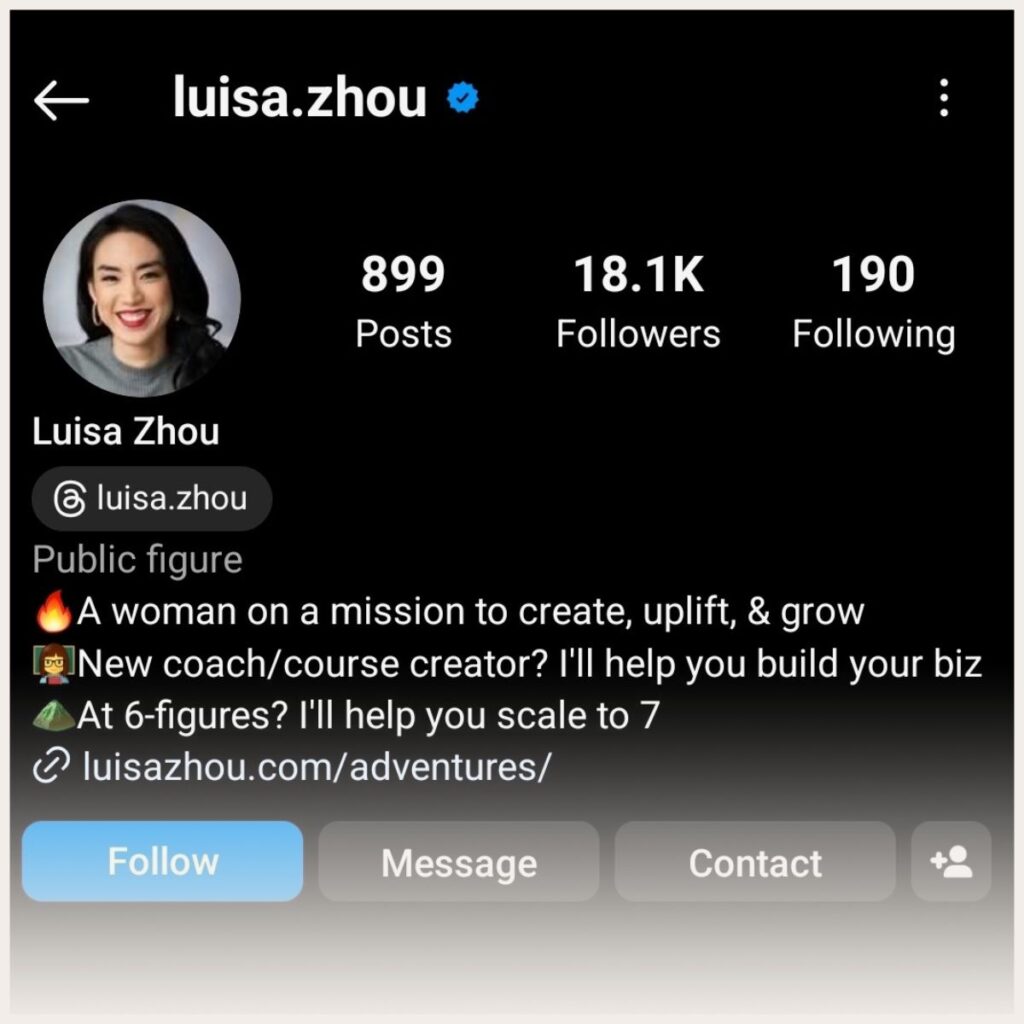
And, of course, be sure to also talk about this during sales calls.
Remember, though…
Sales calls aren’t coaching or consulting calls.
Your objective during calls is to determine if you and a prospective client would benefit from working together in the future, not give them everything they need immediately.
After all, getting results is a process, not something that happens overnight.
You don’t want people to come away from your calls thinking they now have all the information they need to move forward.
Because in reality, your product/service might be the missing link to getting the results they want in the most efficient way possible.
Focus on your client instead of yourself
I mentioned this point briefly already, but it’s so important that it’s worth explaining in more detail here: Fully concentrate on your client and their objectives rather than on what you want.
Here’s an example to make this concept clearer:
If you’re on a sales call, you might be tempted to say something like:
“I think you should buy [my product/service] to get [result].”
But see how that language makes it about you and not about them?
Instead, you could phrase it like this:
“Let me know if this sounds right: You’re trying to reach [objective], and you haven’t seen results using [blank]. Here’s how my offer can help you get unstuck in [specific timeframe].”
In the second example, people are much more likely to come away from the call thinking, “THIS person understands what I want and has the experience to help me get it.”
Describe the benefits
What’s the goal you’re helping people achieve? Whatever that is, that’s where your focus should be.
So, for example, if you’re a health coach who helps people lose weight, you could talk about how they’ll have more energy, feel more confident, and so on.
Remember: Ultimately, the benefits are what matter to people. HOW you’ll help them get there is secondary.
Get the Ultimate Guide
for building a
6-Figure Coaching Business so you can achieve more freedom!
Offer a transformation
This ties into the previous point: Instead of talking about what you’re selling, talk about the transformation people can expect from buying your product/service.
Are they going to be happier? Richer? Healthier? Whatever it is, sell them on the transformation they’ll get.
Use testimonials
Testimonials offer social proof that you can actually deliver.
They encourage your prospective clients to think, “These people achieved their goals using this product/service, so why couldn’t I do the same?”
In fact, 46% of people trust online reviews as much as personal recommendations.
I’ve used testimonials myself to help potential clients see the value in working with me:
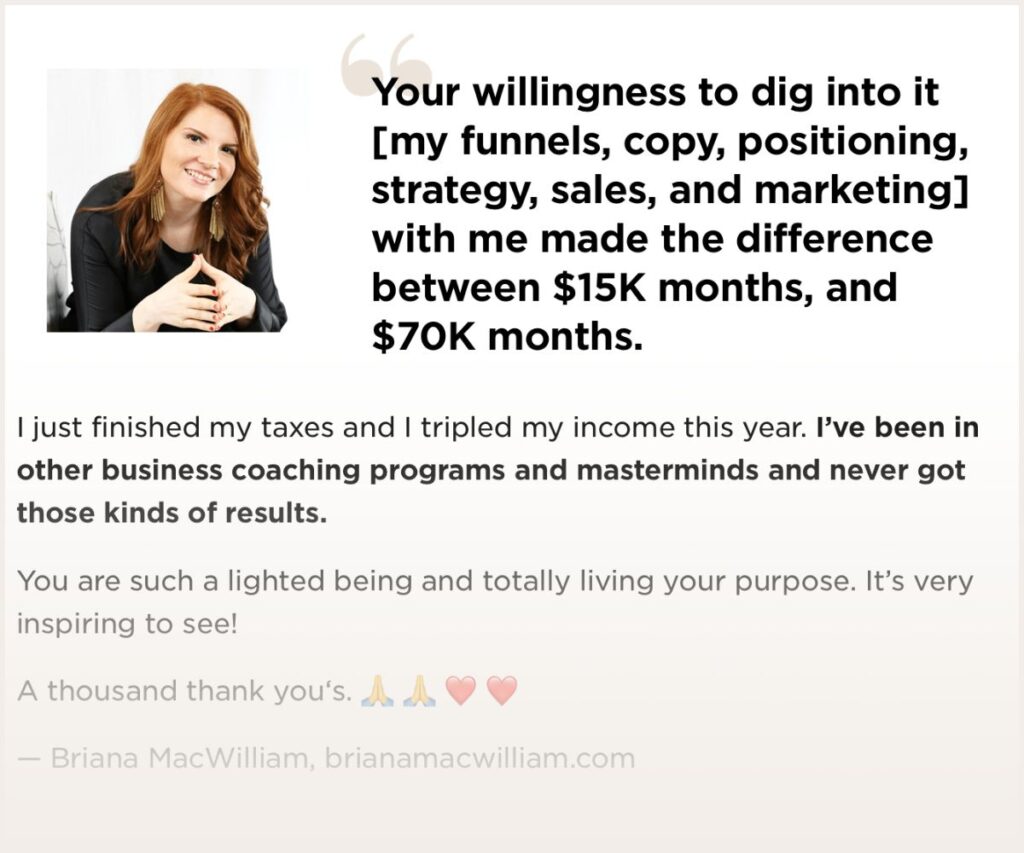
Here’s my guide on how to get testimonials.
Build relationships
Want to know what the easiest way to get sales is?
According to a report by Edelman, 67% of consumers say they need to trust a brand before they buy anything.
Build relationships with people. You can do this by engaging with your audience through social media posts, emails, and even your blog.
In other words?
Don’t just post something and disappear.
Keep in mind that there are real people behind all those social media accounts and email addresses – and they have problems they might need your help with.
Case in point: Want to know how I sold my first coaching package ever?
It wasn’t by running a fancy ad campaign.
In fact, I didn’t even have a website at the time, let alone an offer.
I just started out by helping an entrepreneur I connected with in an online group.
And I was able to help her so much that after a few weeks, she reached out and asked if she could pay me to work with her even more.
The result?
After doing some research, I told her my price was $5,000 for six months of coaching, and she agreed.
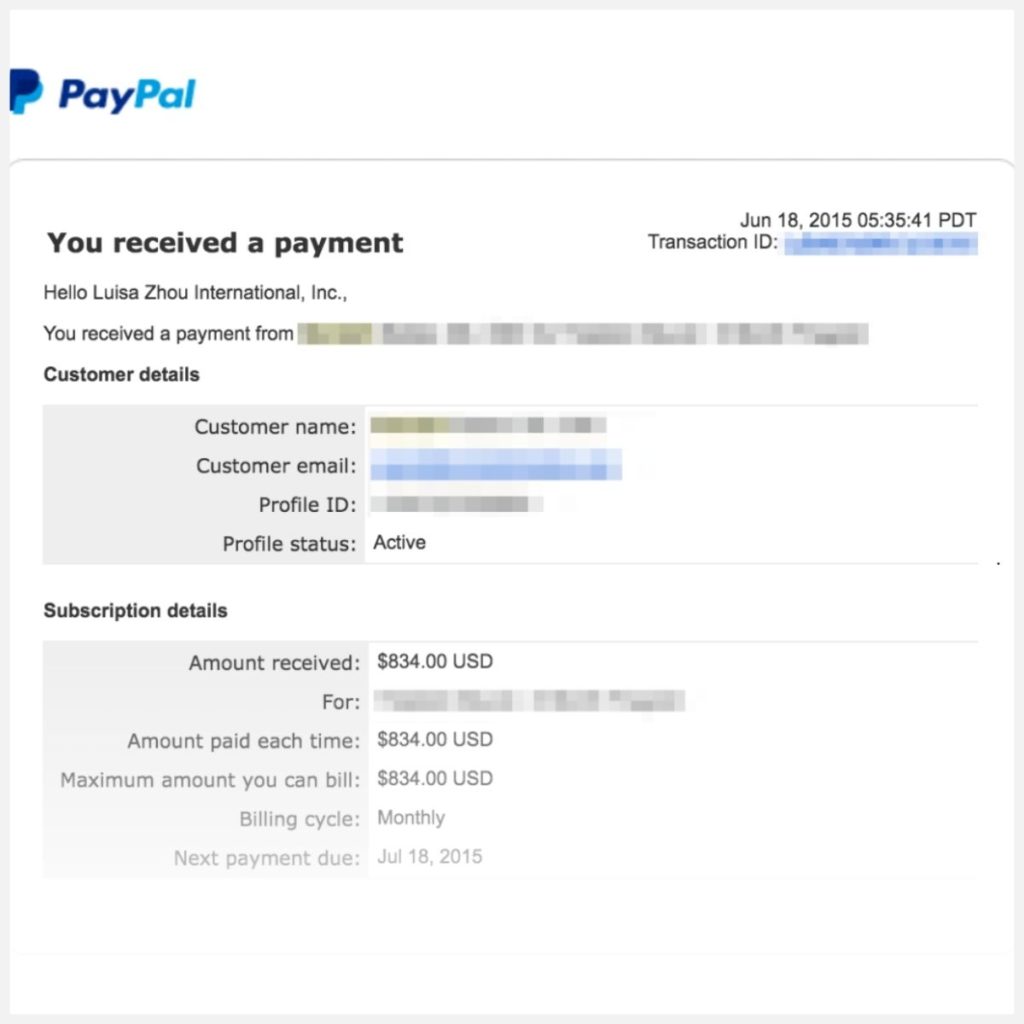
And here’s the thing…
When I joined that Facebook group, I didn’t go in with a salesy mindset at all. My goal was to offer value and understand my audience and their needs better, NOT make sales.
Again, that first client came after I had shown what I could do and built a relationship with her.
So, don’t underestimate the impact of connecting with people before trying to sell anything.
Not only can you make more sales that way, but if your clients refer you, the people they refer you to will be much more likely to also trust you.
Be in integrity
Get the Ultimate Guide
for building a
6-Figure Coaching Business so you can achieve more freedom!
If you want to build a successful business long-term, integrity is key. And part of that means being completely honest about what your offer can do for people – and what it can’t.
Listen: It’s much better to offer smaller results and deliver on them 100% than to offer something you can’t deliver on – and end up with disappointed clients.
For example, I have courses that are designed to help people do things like adopt an entrepreneurial mindset, grow their email lists, or even go from employee to entrepreneur.
In each case, I’m transparent about what people can expect.
Why?
Because I want them to know what they’re buying.
And it works – my clients have gotten exceptional results:

Ultimately, keep in mind that people won’t come back or recommend you if you’re not honest, so it’ll only hurt your business growth moving forward.
Only sell something you truly believe in.
Next steps
So, there you have it! Now you know how to sell without being salesy – which will ultimately help you get MORE sales, revenue, and satisfied clients.
And… since you’ve made it this far, that probably means you’re serious about growing your business.
To build a sustainable business, you need the right strategy.
And that’s what I offer in my blueprint that shows you how to build a six-figure online business:
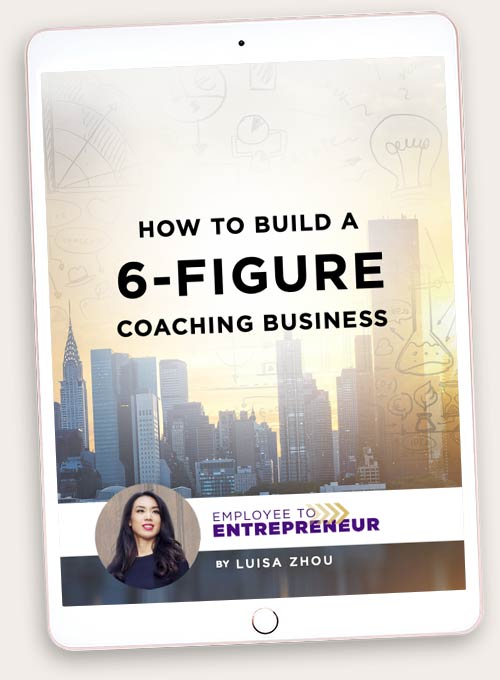
Want to Build a 6-Figure Coaching Business So You Can Achieve More Freedom?
When you sign up, you’ll also receive regular updates on building a successful online business.
Read more:
How to Build an Evergreen Sales Funnel
How to Get Clients Online Using Social Media
